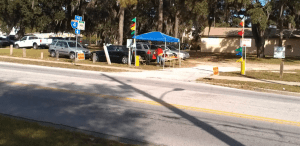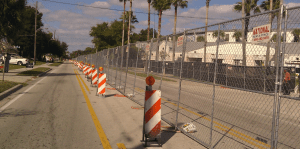Orlando Mayor Buddy Dyer said Monday the city wasn’t trying to send any particular message to African-American businesses and vendors by allowing promoters of the Orlando Calling music festival to erect a fence around the Florida Citrus Bowl, although he does concede perhaps there are lessons to be learned, should a similar situation arise. Dyer was responding to West Orlando News Online over the anger by residents and vendors who felt shut out from benefiting from the festival’s activities last week-end.

“The reason they had fencing is because, you pay one price to get in and there were stages all over the place,” he said. “So, it (the fence) was a means to limit access to the paid folks. You had to pay to get in. ” There were four stages actually outside the Citrus Bowl, so the fencing was to create a general admission atmosphere within the area, he added.
Residents and vendors in the area around the Citrus Bowl are angry and upset that they were not even informed about the festival’s arrangements. They also said they didn’t know that the west gate would be closed off, effectively leaving that side of the facility devoid of patrons or customers. There was a single entrance into the facility on the east side of the building.
Dyer, when pressed, said he was not aware of the access or entrance points to the Citrus Bowl for the music festival, and seemed to suggest he didn’t know there was a single point of entry and exit.
“I haven’t had a chance to talk to anybody on that issue, why they had the flow the way they did, ” he said. “But I do know the promoter was very particular about how they had the flow of traffic, so that all the stages and all that type of stuff worked inside. But I don’t think there was any conscious effort to exclude any of the vendors in any way.”
Vendors said they had never seen this kind of arrangement before with any event at the Citrus Bowl. They feel let down by the city that no consideration was given to them, so they too could have benefited from a facility right in their neighborhood. Vendors told WONO that they lost money as they had paid the necessary fees and bought food supplies, only to end up without patrons.

But, Dyer had a slightly different take, saying the promoter lost several millions on the festival.
“This promoter has done a lot of these (music festivals) over in Europe, but its the first one done in America, so there’s probably lessons to be learned, if they come back and do it again,” said Dyer. “They (the promoters) lost several million dollars in promoting the event. If somebody feels bad that they didn’t get parking revenues, the promoter feels even worse, quite honestly.”


